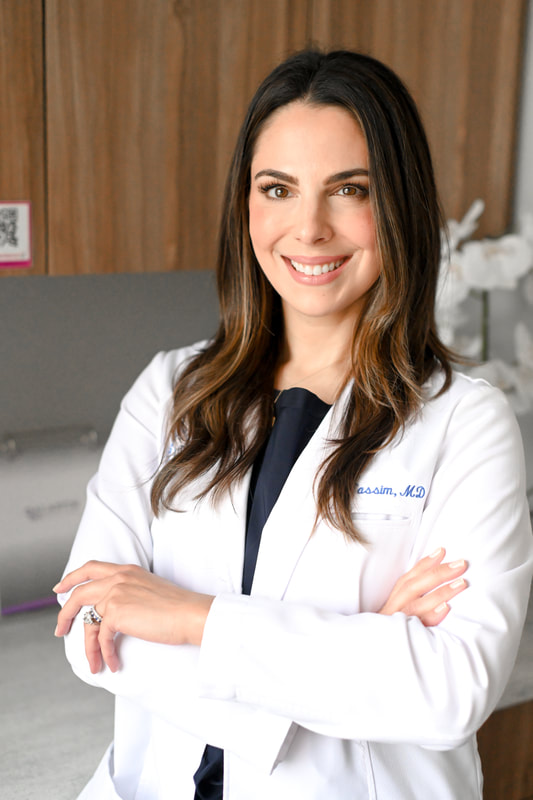Skin Protection and Damage Prevention
|
This month, Dr. Janelle Nassim, Board Certified Dermatologist and fellow of the American Academy of Dermatology, shares her expert insights on skin health, cancer prevention, and the latest advancements in dermatological care.
|
|
Q: Tell us a bit about your background and what led you to pursue a career in dermatology? What is your current role today?
A: I was exposed to science and medicine early on—my mother is a physician and my father is an organic chemist. I first became interested in dermatology as a teenager, while dealing with acne. I was drawn to the idea of helping people feel more confident, and to this day, that remains one of the most rewarding parts of my work. In medical school I found that dermatology was definitely the right specialty for me. It offers the perfect blend of clinical medicine and procedural work, along with the opportunity to interface with many aspects of medicine, including cancer, infectious disease, autoimmune disorders and preventive care. Another aspect I love about dermatology is the continuity of care. Building long-term relationships with patients and their families makes my work truly fulfilling. I completed both my undergraduate and medical degrees at Florida Atlantic University and then went on to complete residency training at Harvard. I’m incredibly grateful for that training. It was a privilege to learn from world-renowned experts, and the program gave me especially strong exposure to lasers and procedural dermatology. Today, I serve as an Assistant Professor of Dermatology and as the Director of Laser and Cosmetic Dermatology at the Indiana University School of Medicine. |
Q: May is Skin Cancer Awareness Month. What are some of the most important facts you wish everyone knew about skin cancer prevention and early detection?
A: There is no such thing as a safe tan. Many people do not know this, but any and all tan is DNA damage. On the other hand, even if you are burned or tan, as dermatologists we want you to come in and have your skin cancer screening. We are here to help you, not to judge you. I always say to my patients that it is extremely important that we do the things we love in life. If you love gardening, jogging, golfing or swimming, by all means do those things! It is so good for our joy and our mental health. But do them safely and with your skin health in mind. Sun protective clothing, sunscreen, seeking shade and choosing non-peak sun hours—avoiding 10am-2pm—are key. Q: Many of our readers are gearing up for summer travel and outdoor activities. What are your top skincare tips to help them protect their skin during the sunniest months? A: Find a sunscreen that you actually like applying and doesn’t feel like a chore. Consider investing in sun-protective clothing, which is great because you don’t have to worry about re-applying sunscreen in those areas. I tell every patient to get a big sun hat and wear it even if you are just walking to the mailbox! This will all pay off over time. Q: Beyond sunscreen, what other daily habits or products do you recommend to keep skin healthy, youthful and protected all year long? A: I like to start with the big-picture basics: eating a nutrient-dense, healthy diet filled with brightly colored veggies, fruits and quality protein. I think people have become too focused on supplements when, in reality, most of what we need we can get from food. Just as important are quality sleep and managing stress levels. Healthy, glowing skin starts from within. When it comes to skincare, consistency is key. For the face and other sun-exposed areas, SPF 30+ is non-negotiable every single day, rain or shine. Beyond these essentials, everyone's skin is different and I always recommend consulting with a board-certified dermatologist. Ingredients like retinoids, peptides, antioxidants, growth factors and exfoliating acids can be helpful, but there is no one-size-fits-all skincare routine. Q: Finally, what new advancements or trends in dermatology are you most excited about right now—especially when it comes to skin health and cancer prevention? A: There has been exciting research recently from my alma mater, Massachusetts General Hospital, showing that certain laser treatments may help prevent specific types of skin cancer. These are the same lasers I use daily for cosmetic skin rejuvenation, so it's fantastic to see evidence they may offer medical benefits beyond aesthetics. Another trend I'm encouraged by is the shift away from the "overdone" look in cosmetics; my preference has always leaned toward a refreshed, natural look that focuses on skin health. I'm excited to see regenerative medicine gaining momentum in dermatology, where we focus on preserving collagen, repairing sun damage, and supporting the skin's ability to renew itself. Q: Is there anything else you’d like to share? A: At a recent dermatology conference I attended, the keynote speaker was none other than Martha Stewart—and she was fabulous. One quote of hers really stuck with me: “I am not about anti-aging, I am about successful aging.” I’ve been sharing this with my patients ever since! To learn more and connect with Dr. Nassim, follow @drjanellenassim on Instagram. |
Copyright © 2025 Pena Group, Inc. All rights reserved.

